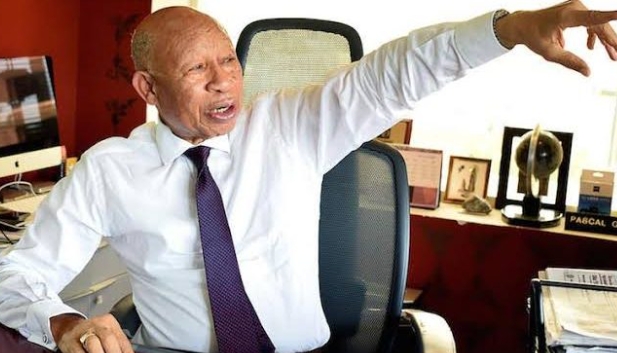News
Reps Raises Alarm Over Poor Capital Budget Implementation

By Gloria Ikibah
The House of Representatives has expressed concern over the low implementation rate of the capital component of the 2024 budget.
Thr Chairman Public Accounts Committee (PAC), Rep. Bamidele Salam, during an interactive session with the Accountant General of the Federation, Dr. Shakirat Madein, on Wednesday, revealed that only 25 percent of the capital budget has been implemented.
The chairman who stated that the underperformance hinders economic growth and development, urged the AGF to expedite the submission of the 2022 Consolidated Financial Statement to the Auditor General in line with constitutional provisions.
Rep. Salam lamented Nigeria’s lag in timely audit report submissions compared to Kenya, Ghana, and Rwanda, attributing this to delays in financial statement submissions by the Accountant General’s office.
Addressing revenue leakages, the committee called for stricter measures, including process automation and regular audits of Government-Owned Enterprises. It also instructed the Accountant General, the Ministry of Foreign Affairs, and the Ministry of Interior to resolve issues delaying the automation of revenue collections from foreign missions to enhance transparency.
Rep. Salam disclosed that the 2021 Auditor General’s Report, recently submitted to the National Assembly, would be prioritized once the 2024 Appropriation Bill is passed.
In her remarks, Dr. Madein attributed delays in the consolidated financial statement to inadequate data from the Central Bank of Nigeria (CBN) but assured that efforts to resolve this are near completion. She pledged to conclude the process within two months.
The Accountant General also highlighted ongoing initiatives to enhance public expenditure management, including a review of the Financial Regulations 2009, which is awaiting Federal Executive Council approval.
News
Tinubu: Pascal Dozie’s contributions to Nigeria’s economic architecture left an enduring legacy

By Kayode Sanni-Arewa
President Bola Ahmed Tinubu extends his heartfelt condolences to the Dozie family, the business community, and all Nigerians on the passing of Chief (Dr.) Pascal Gabriel Dozie, an elder statesman, entrepreneur, and banker. He was 85.
Chief Pascal Dozie, OON, was a visionary whose contributions to Nigeria’s economic architecture left an enduring legacy.
As the founder of Diamond Bank and the pioneer Chairman of MTN Nigeria, he was at the forefront of two of the most transformative sectors in Nigeria’s development journey: banking and telecommunications.
Chief Dozie, a steadfast believer in Nigeria’s vast potential, was pivotal in shaping the financial services industry and expanding access to mobile connectivity nationwide. His influential leadership extended well beyond corporate boardrooms.
In addition to his business acumen, Chief Dozie served as a former director at the Central Bank of Nigeria, President of the Nigerian Stock Exchange, and Chairman of the Nigerian Economic Summit Group, dedicating decades of service to national policy formulation, private sector development, and youth empowerment.
President Tinubu lauds Chief Dozie as “a rare breed business leader whose wisdom, humility, and pioneering efforts laid a foundation upon which many continue to build. His passing is a profound loss to the private sector and Nigeria.”
The President prays for the peaceful repose of Chief Dozie’s soul and extends his condolences to his wife, children, and extended family. He calls upon the Nigerian private sector to honour Chief Dozie’s memory by upholding the values of integrity, innovation, and nation-building, for which he was renowned.
*Bayo Onanuga
Special Adviser to the President
(Information & Strategy)
News
TRADE WAR! U.S. angry over Nigeria’s import ban on 25 products

By Kayode Sanni-Arewa
The country’s reaction comes at a time when tensions are rising over its sweeping tariffs imposed on several countries.
Nigeria’s import ban on 25 different product categories impacts U.S. exporters, particularly in agriculture, pharmaceuticals, beverages, and consumer goods, the United States Trade Representative said in a statement on Monday.
According to the statement posted on its X platform, Nigeria’s restrictions on items like beef, pork, poultry, fruit juices, medicaments, and spirits limit U.S. market access and reduce export opportunities.
“These policies create significant trade barriers that lead to lost revenue for U.S. businesses looking to expand in the Nigerian market.
The country’s reaction comes at a time when tensions are rising over its sweeping tariffs imposed on several countries.
Last week, the Trump administration imposed various tariffs ranging between 10 per cent and 65 per cent on different countries across the world, including Nigeria which got a 14 per cent tariff on its exports to the United States.
Nigerian stocks on Monday recorded their biggest drop in recent times following the impact of U.S President Donald Trump’s tariffs on global trade markets.
Investors lost about N659 billion at the close of trading after the Nigerian Exchange’s All Share Index (ASI) decreased by 1.23 percent, its biggest single-day decline this month.
Stocks like Oando and Honeywell Flour Mills helped to push the market lower. Oando decreased the most, from N42 to N37.80, down by N4.20 or 10 percent, while Honeywell dropped from N11.32 to N10.19, losing N1.13 or 9.98 percent.
The Nigerian Exchange Limited (NGX) All-Share Index (ASI) and equities market capitalisation decreased from the preceding day’s 105,511.89 points and N66.147 trillion, respectively, to 104,216.87 points and N65.488 billion. The Nigerian market’s return this year has decreased to +1.25 percent.
Countries such as China have since said they would retaliate from the imposed tariffs.
China vowed on Tuesday to “fight to the end” against fresh tariffs of 50 percent threatened by US President Donald Trump, further aggravating a trade war that has already wiped trillions off global markets.
The Minister of Finance, Wale Edun, on Monday said that the Federal Government will boost non-revenue as a means of cushioning the adverse effects to trade tariffs imposed on countries by President Trump.
Edun also assured that the Economic Management Team (EMT) will meet to assess the likely impact of the 14 per cent tariff on goods exported from Nigeria to the United States.
He said the EMT will afterwards, make recommendations to cushion its impact on the nation’s economy.
Edun, who was speaking at an event organised by the Ministry of Finance Incorporated on Monday, said that while the adverse effect on Nigeria will be through an oil price plunge, the government is intensifying efforts to ramp up oil production and boost non-oil revenues.
News
INTERVIEW: Introduction of Child Rights Curriculum In Nigerian Universities Will Take CRA to Families – Dr Obiorah Edogor

…says implementation of CRA in Nig is far below average
Dr. Obiorah Edogor, is a Mass Communication lecturer at the Nnamdi Azikiwe University, Awka Anambra State and Child Rights Advocate, in this chat with Naijablitznews.com Associate Editor, Gloria Ikibah, he spoke extensively on why the university domesticated Child Rights Reporting into its journalism curriculum and the general studies course as UNICEF worked with the National Universities Commission (NUC) and the National Board for Technical Education (NBTE) to include the course in all of the unbundled Mass Communication courses, called JMS Journalism and Media Studies 403” and that the course would empower journalists-in-training with the capacity and understanding of the issues around child rights and how to report them.
Hear him:
What do you mean by child right curriculum?
Child rights curriculum is the outlined educational programmes which are to guide the teaching and learning of everything approved to be taught concerning the natural entitlements and privileges that every child should have or enjoy as a human being.
Why did you introduce it in the university system, one would have thought it will be in secondary school?
I feel that it was introduced in the university system as the best place where those who would learn it could easily put it into practice. The lecturers could research different dimensions of it, and the university students with their level of maturity would be guided by it.
The students could also take the messages back to their homes more than the secondary school students. However, it is not out of place to have it in secondary schools, too.
Of what benefits is this curriculum to the achievements of the implementation of the Child Rights Act?
The curriculum will be useful towards achievements of the implementation of the Child’s Rights Act 2003 because it is the easiest way to teach the students about the contents of the CRA of Nigeria. It is a way of making students have knowledge of their rights and responsibilities as provided in the CRA 2003.
How will you score the implementation of the Act in Nigeria?
I will score the implementation of the Act in Nigeria very poor because of the different concerned individuals and the relevant government agents’ lackadaisical attitude toward practical protection of the rights of the child in many angles.
How many universities have introduced the child rights curriculum?
I don’t have the exact number of universities that have introduced the child rights curriculum in Nigeria, but I say that every department of Mass Communication in Nigeria is expected to have introduced from 2019, because it was part of the Benchmark Minimum Academic Standard which all mass communication stakeholders including lecturers selected from different universities, representatives of different communication regulatory bodies and relevant international organisations prepared for teaching undergraduate programmes of mass communication as directed by the National Universities Commission (NUC).
However, I must emphasise that Nnamdi Azikiwe University is one Nigerian university that has done exceptionally well with regard to the implementation of child rights reporting and education curriculum. The university Senate has approved introduction of child rights courses in the General Studies Unit, faculties of education, law, and the social sciences. That’s why I facilitated UNICEF partnership with the university to train the lecturers who would teach the newly introduced courses in the university.
FIRST PUBLISHED ON July 23, 2023.
-

 News6 hours ago
News6 hours agoJust in: Founder of Diamond Bank and ex-chairman of MTN, Paschal Dozie is dead
-

 News13 hours ago
News13 hours agoRainfall washes away newly constructed multi-million naira road in Edo State
-

 News13 hours ago
News13 hours agoEvangelist Kekere Jesu buried amidst deep sorrow
-

 Metro13 hours ago
Metro13 hours agoStray bullet from VIP convoy kills bystander in Abuja
-

 Sports6 hours ago
Sports6 hours agoReal Madrid keeping tabs on Victor Osimhen
-

 News7 hours ago
News7 hours agoNaira Nosedives Against Dollar
-

 News24 hours ago
News24 hours agoVerbatim Magazine Honours Prof Nnamchi For Legislative Excellence, Quality Leadership
-

 News12 hours ago
News12 hours agoLG autonomy: Govs block council chairmen from opening CBN accounts


















